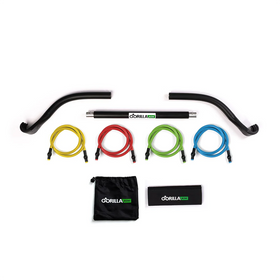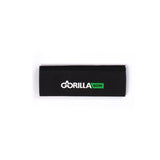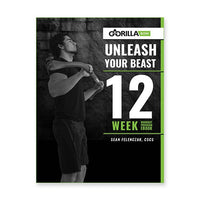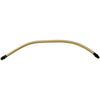Carb Loading the Night Before a Workout: Should You Do It? (And How?)

If you’ve ever trained for a race or another fitness-based competition, you’re probably familiar with carbohydrate loading. Maybe you picture a bunch of athletes sitting down with a large spaghetti plate — complete with tomato sauce and toasted Italian bread — before getting up earlier for the big race day.
But carb-loading before lots of physical activity is a little more complicated than that. There are specific ways to do it — and certain times when it’s actually beneficial.
Is it as simple as carbing up the night before your workout, or is there more involved?
Here’s what you should know.
Carb-Loading Definition: What It Really Means
Carbohydrate loading, also known as “carb-loading” or “carbo-loading,” is when someone eats a high-carb diet in the days leading up to an athletic event. The higher carb intake is usually combined with less activity during this time.
Carbohydrates are your body’s main energy source (glucose), so you need carbs to perform physical activity. When you consume more carbs than your body needs, extra glucose is stored as glycogen in your liver and muscles. (And when the glycogen stores are full, the body stores the excess as fat.)
During an average workout, most people have enough glycogen stores for their body to use for energy. However, for athletes and those who engage in more extended periods of exercise, carb-loading increases stored glycogen to make more energy available.
Modified Carb-Loading
The original form of carb loading involved a “depletion phase.” During this phase, the athlete would decrease their carbohydrate intake to 10 percent of their diet for 3-4 days while training as usual. Then, they would start the carb-loading phase for 3-4 days.
Today, a modified form of carb loading is more common, which does not include the depletion phase. Experts stopped recommending the original form after newer research showed carb-loading can still increase glycogen stores without depleting them first.
Plus, for many athletes, the downsides of carb depletion outweighed potential positives. Subsisting on very few carbs while training for an athletic event causes undesirable symptoms like tiredness, sluggishness, and irritability, just to name a few.
How to Carb-Load: Should You Do It the Night Before a Workout?
According to Mayo Clinic, carb-loading should start one to three days before your athletic event. So, that time period can include the night before a workout — if your training will last 90-plus minutes. (And we’ll get into that more below.)
You don’t necessarily have to eat your carbs late at night, though. It depends on when you typically stop eating for the day.
Here’s how carb-loading works:
- One to three days before the event, athletes should increase carbohydrate intake to 525 to 550 grams per day or where their carbs make up 65 percent of their diet, whichever is higher, according to Nutrition Specialist Linda Boeckner at the University of Nebraska.
- To avoid taking in too many calories during carbo-loading, reduce your intake of higher-fat foods as you eat more carbs.
- During carb-loading days before the event, cut back on your training volume to maximize glycogen stores.
The exact number of carbohydrates to eat can depend on how much exercise you’re doing. For example, endurance athletes often benefit from a carb surplus in the higher range.
Also, if you are doing 90-plus minutes of continuous activity the next morning, but you haven’t been focusing on carb-loading in previous days, it’s not enough to eat carbs just the night before. Your body will need at least a full day before the event (preferably 48 hours or more) to increase glycogen stores.
When Should You Use Carb Loading?
Carb loading is only necessary when performing intense, continuous exercise for longer than 90 minutes. Think marathon runners, long-distance swimmers, and triathletes. This also applies to non-professional athletes training for long periods of physical activity, such as a 10k or marathon.
As far as specific times, it doesn’t seem to matter when you eat. The important thing is making sure you eat a high-carbohydrate diet during your carb-loading days.
Carb Loading on the Morning Of
The last time you eat during carb loading should be four hours before your event, according to Dr. Trent Stellingwerff at the Canadian Sport Institute Pacific. Four hours gives you enough time to digest while ensuring you get enough fuel. According to Stellingwerff, you can lose up to 50-75 percent of liver glycogen during the night.
When It Doesn’t Work
Carbo-loading isn’t beneficial for exercise lasting less than 90 minutes. That’s because it takes about 90 minutes for glycogen stores to deplete.
Loading up on carbs for a shorter workout is unlikely to improve your performance. But loading up on carbs in the days before a 90-plus minute event will fill up your stores your body can use past that mark.
Plus, if your main fitness goal is weight loss, loading up on carbs can mean eating more calories than you need, leading to weight gain. Excess carbs can also cause bloating, increasing your water weight, which can be detrimental to shorter-term exercise.
Is Carbo Loading Really Effective?
The answer is that “it depends” on the person and circumstances.
According to Mayo Clinic, carb loading can increase muscle glycogen stores in men by up to 100 percent. Women can also benefit from carb-loading, although they might need to consume more calories to achieve the same results.
Carbohydrate loading can also help with the following during an endurance event:
- Improving performance
- Reducing muscle fatigue
- Increasing energy levels
Other factors can also impact the effectiveness of carbo-loading, such as your fitness level, hydration level, and how intensely you’re exercising. It’s not a guaranteed way to supercharge performance, but the evidence shows it can help most people.
Carbing Up During a Workout: When and How
What you eat before an endurance event is not all that matters, though. For continuous physical activity lasting over 90 minutes, you’ll also need to replenish your glucose levels every hour or two.
Some people will need to consume carbs during a workout lasting 60 minutes or more, especially if it’s high intensity.
The American Heart Association (AHA) recommends eating 50-100 calories every 30 minutes. Convenient, quick carb sources for endurance athletes include glucose gels, sports drinks, chews, and candies. Whole food carb sources to consume during a long workout include:
- Raisins
- Banana
- Low-fat yogurt
- Energy bars
- And other high-carb, low-fat, low-protein, low-fiber foods
Basically, you want to focus solely on refueling your body with carbs during a long workout.
And don’t forget about hydration. No matter how long you exercise, it’s best to take small, frequent sips of water to stay hydrated. Concentrated carbohydrate sources and solid carb foods can reduce fluid absorption, further increasing the need for hydration.
What to Do After Carb Loading: How to Eat
You’ll still need carbs after you’ve been carbo-loading and have completed your physical activity. But it’s time to bring in the other nutrient groups, too.
University Hospitals advises a meal containing lean protein, healthy carbs, and vegetables for optimal muscle recovery. It’s also best to eat your post-exercise meal within 2-3 hours from the end of your exercise.
Besides replenishing carbs and calories, continue drinking water, and take stock of your physical state. Stretch, ice, and foam rolling can be your best friends after intense exercise. And let’s not forget sleep!
What About Eating Carbs Before a Shorter Workout?
Eating carbs as fuel right before a workout is not the same as a carb-loading diet. A pre-workout meal or snack provides more immediate energy for your same-day workout.
If you can, consume carbohydrates 2-3 hours before your workout. Think healthy carbs like:
- Whole wheat toast
- Whole-grain cereal with milk
- Brown rice
- Whole grain pasta
- Fruits or vegetables
- Fat-free or low-fat yogurt
It’s generally best to avoid too much protein or saturated fats before a workout. Both take longer to digest, requiring energy that could be preserved for your muscles. You want to give your body the easily-digestible nutrient (carbs) that it can use now. Otherwise, you might feel sluggish and tired during your workout.
Now, what if you need a super quick snack before a workout? If you don’t have hours — and maybe you only have about 10 minutes — a single serving of fruit (like an apple or banana) works great.
The Best Foods for Carb Loading
Remember that the goal is to increase your ratio of carbohydrates, not your overall calorie intake, during carb loading. To ensure the most carbs for your calories, focus on high-carb, low-fat, and semi-low-fiber foods.
The best examples include:
- Grains like oatmeal, bread, rice, pasta, and cereal. Grains provide the highest glycogen amounts that your body can quickly and easily absorb.
- Fruits like raisins (and other dried fruit), fresh mangoes, bananas, grapes, apples, pineapple, and fruit juices. Fruits are typically low in starches but high in useful carbohydrates.
- Starchy vegetables like sweet potatoes, white potatoes, carrots, and corn.
- Low-fat dairy (or non-dairy) products like skim milk, almond milk, oat milk, chocolate milk, cottage cheese, and Greek or other low-fat yogurts.
- Sweet foods like honey, agave nectar, and sherbet (best used as small snacks or condiments, such as drizzling honey over yogurt or on toast).
While carbs are the shining stars during pre-race carbo-loading, protein is still important. After all, you want to fuel and maintain the muscles you’ll need during your event.
Low-fat or fat-free dairy products are good choices for getting both carbs and protein. Other good protein sources during carb-loading include lean meats and fish. In addition, quinoa is a fantastic plant-based option for protein.
Also, the best foods for carb-loading are those you enjoy and find familiar. You’re more likely to stay consistent when you know how your body will respond to those foods. If you do want to try out different carb sources, do any experimentation during training — not right before (or on the day of) your athletic event.
Best Foods to Eat the Night Before a Workout
If you’re planning to fit in an early morning workout, what you eat the night before can have an impact.
And what you should eat will depend on the type of exercise you’re going to do.
Carbs for Cardio Workouts
If you’re planning to go for a cardio session, such as a long run, whole food, high-quality carbohydrates are key the night before. Good examples are whole-grain bread, brown rice, whole-wheat pasta, fruits, vegetables, and starches like potatoes. Shoot for a 3:1 ratio of carbs to protein before cardiovascular exercise.
Some call this “carb-loading,” even though it’s not technically the same because you’re eating for a shorter workout the day before. Focus on quality carbohydrates sources, and drink plenty of water.
Carbs for Strength Training Workouts
If you’ll be hitting the gym to lift weights or doing resistance training at home (or wherever), you’ll still want high-quality carbohydrates, but protein is important too.
Eating a meal with quality protein the night before a weight or resistance training workout will help preserve muscle mass. A 2:1 ratio of carbs to protein is smart before strength training.
Here are some examples of meals to eat the night before a workout:
- Whole grain pasta, brown rice, or quinoa with lean meats, tomato sauce, and vegetables
- Baked potato with bean chili and vegetables
- Vegetable stir-fry with lean meats (or plant-based proteins), served with brown rice
- Scrambled eggs or an omelet with veggies, served with whole-grain toast and a fruit salad
- A sandwich with lean meat, whole-grain bread, and veggies
Also, keep in mind that your body needs time to digest and absorb the food before it’s useful for fuel. Thankfully, eating a healthy meal the evening before a morning workout gives you time to digest throughout the night and as you sleep, which is ideal.
Fats vs. Protein vs. Carbs Before a Workout
At this point, you might be wondering, “what about fats?” We know carbs and protein can be beneficial in pre-workout meals and snacks. Where do fats fit in?
Before a workout, fat is not the most important nutrient to consume. Since your body needs longer to digest dietary fat, you’ll probably want to limit fats when fueling for a workout — unless you’re eating your meal or snack much earlier. You’re safer having a balanced meal with healthy fats the night before versus a meal you have less than three hours before your exercise.
Having food sitting in your stomach as you exercise can also make you feel sluggish and nauseous, and it can even cause heartburn. So, time your pre-workout meal times carefully.
Carbohydrate-Rich Foods to Avoid When Carb Loading
Some carby foods will be fine for one person while causing trouble for another. So, this list of carbohydrate foods to avoid during carb-loading will not be 100 percent accurate for everyone. Rather, these foods can cause issues for some people.
Carb-Containing Foods with Too Much Fat
Since it’s no longer the ‘90s, we know (good-quality) fats are good. But when you’re loading up on carbs to maximize glycogen stores, fats aren’t ideal.
Unfortunately, many of the tastiest carb-rich foods are also high in fats. We’re mostly talking about desserts, including cookies, cakes, chocolate bars, and ice cream. Butter-laden bread, creamy sauces, and other rich foods are also examples.
Choosing foods that are high in carbs and fats can take too long to digest as you prepare for your workout. Plus, high-fat foods — especially those that don’t offer much nutritional value — can increase your overall calories.
Ideally, you want to increase your carb intake without changing your daily calorie intake. That means avoiding foods that are too high in fat and calories, even if they also contain a decent amount of carbs.
Carb-Containing Foods with Too Much Fiber
Typically, fiber-rich foods are fantastic for a healthy diet. But when you’re eating before a workout or athletic event, you might need to limit high-fiber options like cruciferous vegetables, beans, legumes, and high-fiber fruits.
Too much fiber, especially if you’re not used to consuming high-fiber foods, can lead to bloating, painful gas, and other related issues. That’s the last thing you want to deal with when preparing for an important athletic event.
Will Carb Loading Make You Gain Weight?
If you consume more calories than you need during carb-loading, it can lead to weight gain. However, you can also experience temporary water weight gain, which is normal.
Two to four pounds of water weight gain is typical during carb-loading, so don’t be surprised if the scale increases slightly. Also, if you feel a little weighed down when you start your event, that should subside as your body starts to utilize your stored glycogen.
In conclusion, carbing up the night before a workout can help if that means eating a carbohydrate-rich meal the night before. However, carb-loading typically requires more time — at least one to three days before an endurance event.
And if you’re simply performing an exercise that lasts less than 90 minutes, carb-loading isn’t necessary. You can focus on eating carbs the night before or a few hours before your workout.
______________
Sources:
- https://www.active.com/nutrition/articles/the-evolving-art-of-carbo-loading
- https://www.mayoclinic.org/healthy-lifestyle/nutrition-and-healthy-eating/in-depth/carbohydrate-loading/art-20048518
- https://elemental.medium.com/is-carbo-loading-still-a-thing-7e1f9e357d84
- https://www.mayoclinic.org/healthy-lifestyle/nutrition-and-healthy-eating/in-depth/carbohydrate-loading/art-20048518
- https://www.heart.org/en/healthy-living/healthy-eating/eat-smart/nutrition-basics/food-as-fuel-before-during-and-after-workouts
- https://www.ncbi.nlm.nih.gov/pmc/articles/PMC4008807/
- https://www.uhhospitals.org/Healthy-at-UH/articles/2021/08/water-carbs-and-race-day-eating-what-endurance-athletes-should-know
- https://runningmagazine.ca/health-nutrition/what-are-the-best-carbs-for-carb-loading/
- https://www.onegreenplanet.org/natural-health/how-to-carb-load-the-healthy-vegan-way/










Leave a comment